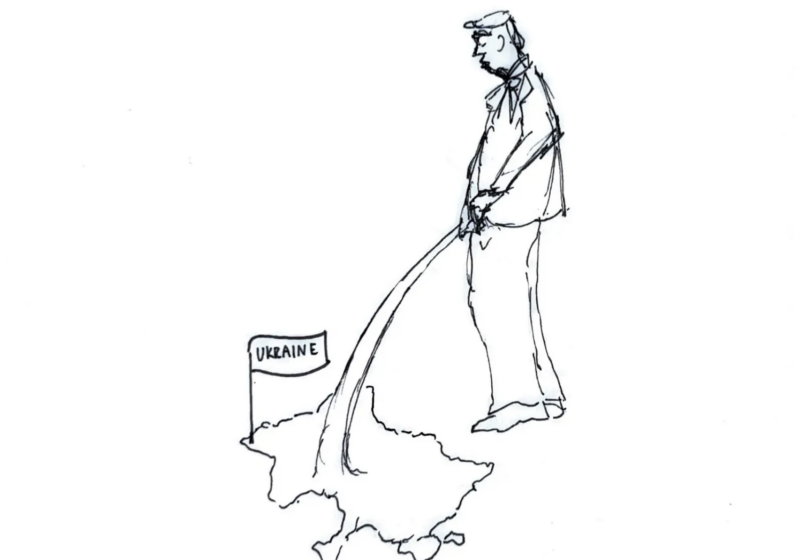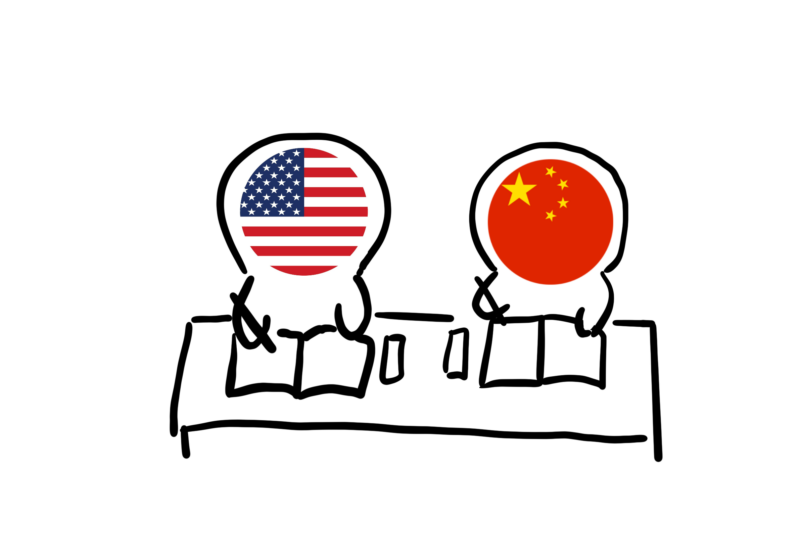I’d never thought that a hasty White House visit from a foreign leader would shift my opinion on a subject more than Ukrainian President Zelenskyy’s visit to Washington. After the encounter between Zelenskyy and President Trump, I feel reaffirmed in a few of my beliefs about foreign policy and international conflict.
First, I feel some context is needed as rationale. So I want to start with this.
According to the New York Times, 500,000 Ukrainian and Russian casualties were reported by a US official in August of 2023 These casualties are not just a tally that we add onto a piece of paper. They are real people, and their stories are as meaningful as they are tragic.
In high school, I had a friend who was a first-generation Ukranian-American. Her family, like many Ukranians, is directly affected by the war.
As her grandparents lived in the center of Ukraine, uncertainty swirled over their safety each day. I remember asking how her family was doing. Often, the answer was that she didn’t know.
Although her family was unharmed, they were struggling. Struggling to find stability, communication, and one vital thing: strong support from their new homeland, the United States.
My friend’s story is not unique. She, like the nearly million other Ukrainian-Americans in this country, are living this nightmare every day.
So, when I saw the President of the United States threaten, belittle, and humiliate the Ukrainian President in the Oval Office during a meeting about Ukraine’s security, I started to lose support for our commander in chief.
While I’ve tended to agree with the majority of President Trump’s policies, I wholeheartedly disagree with his approach to the Ukrainian war with Russia. Even so, I believe that President Trump isn’t the first president to disappoint Ukraine.
In a 1994 negotiation, Ukraine agreed to cease its nuclear program and transfer its strategic nuclear stockpile to Russia in exchange for security guarantees between Russia, the United States, and the United Kingdom.
Since this agreement — more commonly known as the Budapest Memorandum — President Obama abandoned the U.S.’ commitment to Ukraine by essentially ignoring Russia’s 2014 annexation of Crimea, a Ukrainian sovereign territory. This turn of the head in Ukrainian policy towards Eastern Europe propped up Russian confidence, and could be one of the main reasons why under the Biden Administration, eight years later, Russia launched a full scale invasion into Ukraine. And now, President Trump is prepared to guide the U.S. away from the negotiating table after 11 long years of failed leadership, further alienating our ally Ukraine, and breaking even more promises set forth in many treaties and charters in the past by canceling U.S. military aid and assistance.
So, you’re probably wondering. Who cares? Why does this matter? Why should the United States care about an expensive war an ocean and a continent away?
I would argue that, while I want a quick and swift ending to the Ukrainian war with Russia, the U.S. is losing its respect internationally by abandoning our promised support for our allies.
In the past, America had power in our word. During conflicts and global instability, the reassuring fact of U.S. support has prevented or ended geopolitical escalation in many tense situations. When we promised security and respect of Ukraine’s sovereignty in the 1990s, we assured Ukraine that it could exist as a non-nuclear nation free from anxieties surrounding the tyrannical threat of Russia’s rule.
This promise has since been broken on multiple occasions.
With new leadership, we have an opportunity to right the ship in Ukraine. Unfortunately, it seems that we continue to steer away. President Trump’s foreign policy goals in Ukraine have been perplexing —. instead of focusing on mining rights and an American-only gain, he focuses on expanding the sanctions on Russian oligarchs, businesses, and oil tycoons. He should start increasing aid to Ukraine so they can finally do what is needed to actually end this war.
The way that President Trump is treating the nation’s foreign policy agenda is shameful. While I agree with the president about an America First policy agenda, it feels that we are shifting to an America Only way of thinking. This type of disconnect in thinking about geopolitics is very worrying. In light of the recent breakdown in NATO and other close allies’ trust, we urgently need to protect our allies from foreign threats that undermine both them and ourselves.
One of the most beautiful things about Ukraine is its people. The spirit and resilience they show us every day is a testament to what the world should be. People who, in hard times, support each other. A people who, under immense pressure, rise and serve their nation for a greater good. A common chant yelled by Ukranians as they supported troops who started to be deployed against Russian invaders was “Slava Ukraini,”, which translates to “glory to Ukraine.” The response from crowds after this chant was “Heroyam Slava” — which means glory to the heroes.
With nearly a million people dead and the war moving into its third year, President Trump could learn a thing or two from the people of Ukraine, and from their camaraderie.
The glory of a nation is shared with the heroes who defend it. Trump will have to come to a decision soon on whether he will be Ukraine’s hero, or if he will be its downfall. Will he abandon our promises in favor of what is convenient for America Only, or will he continue to claim he is putting America First?






